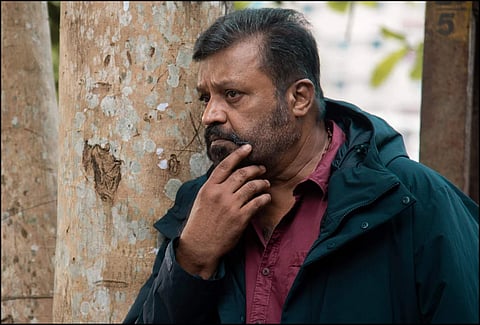Paappan Movie Review: Few neat touches in a largely exhausting film
Rating:(2 / 5)
In an ideal Suresh Gopi cop thriller, the superstar would be a dominant presence throughout -- unless, of course, he is playing a cameo in another superstar's thriller. There are times when Paappan feels like a Suresh Gopi movie and times when it doesn't. It mostly leans towards the latter. However, it does feel like a Joshiy movie, albeit a lesser one. Paappan is closer in spirit to one of my favourite Joshiy thrillers, Ee Thanutha Veluppan Kalathu (ETVK). In that film, Mammootty played the investigating officer, and Suresh Gopi was a suspect. At one point in Paappan, Suresh Gopi's seasoned policeman has to deal with a suspect who goes through a similar situation as his character did in ETVK. The ETVK-Paappan similarities don't end there, but going further might give away crucial plot points.
Cast: Suresh Gopi, Neeta Pillai
Director: Joshiy
One of the 90s-set flashback events in Paappan — and one can see why Joshiy was apt for the material — is not too different from that of another iconic Suresh Gopi cop, Bharatchandran. Like its eponymous antihero, Paappan often feels like a relic from a different era and suffers as a result. What's strange is how Joshiy, who got naturalistic performances out of actors in another contemporary film of his set entirely in the 90s, Porinju Mariam Jose, has now made a movie with Malayalam television-friendly performances. It's the main reason why the film, despite some neat twists, becomes a strenuous experience. Does the story justify the 170-min runtime? Yes, but there's a catch: enduring every patience-testing development preceding those twists.
I'm not saying that all of Paappan is a bore. We get some nice touches, like having Vincy (Neeta Pillai), the estranged police daughter of Paappan, headline the investigation. You might ask if Paappan is not involved in the same. He is, but his is more of a 'background' investigation, the details of which are only gradually revealed. Having a young female investigator in charge is refreshing for a filmmaker who made a career out of largely male-dominated thrillers. This means Paappan behaves more like a secondary character even though the film is named after him and even opens with him. The other interesting touch is seeing Suresh Gopi as a mellowed-down figure. This is not the same man who used to bombard the bad guys with fiery, at times expletive-laced, monologues in those Shaji Kailas or Joshiy classics. This is a man who is still grappling with a past tragedy. This is a man who regrets putting his duty over family. This is a man whose daughter looks at her father the same way Karthika looked at Kamal Haasan in Nayagan. He also gets us curious: Is this a man motivated by vengeance? Or is this a man who knows that he shouldn't let his past tragedy get in the way of true sleuth work? Is he capable of being dispassionate?
I also liked how the after-effects of past events have repercussions on the present. It takes you through multiple murders, twists and turns, most of which serve as effective -- to a certain extent -- red herrings. The film opens with a murder where the victim turns out to be someone unexpected. The murder pattern resembles something that occurred decades ago. There is a killer from a past who also happens to be a killer with a past. The same killer is attached to his mother à la Norman Bates from Alfred Hitchcock's Psycho. When similar murders occur again, the suspicion naturally falls on one individual. Did he really do it? Or was it someone else?
There was one twist, in particular, I found refreshing. I felt the film would've worked much more had the makers concluded everything with it instead of introducing an additional element for intensity-amping. It's not only a classic case of too many cooks spoiling the broth but also of hammy, unintentionally comical performances diluting the impact of the proceedings.
Suresh Gopi does the seasoned cop act quite decently. But everyone else behaves as though they have been instructed to perform like teleserial actors. Most of the lines are downright cringe-inducing and jarring. At one point, a character tells his wife, "When there is 'we too', why should you worry about Me Too?" Such lines, appearing in the very early portions of the film, get you more concerned about the remainder of the film's duration. There is a nagging worry about dealing with more lines like this in the rest of the film. I also felt Neetha Pillai, who was brilliant in Abrid Shine's Poomaram and Kung Fu Master — was an ill-fit for Vincy because she didn't seem comfortable, evident in the straining manner she emotes whenever burdened by heavy emotions.
We don't get to see anything inventive in terms of the storytelling/filmmaking approach either. Once again, we get the much-familiar zooms and frame rate manipulations we have seen numerous times before. The familiarity is also a problem with respect to the visuals (teal-and-orange lighting) and Jakes Bejoy's repetitively deja vu-inducing score. At a time when we have seen superior investigative thrillers from all over the world, Paappan feels quite outdated.


